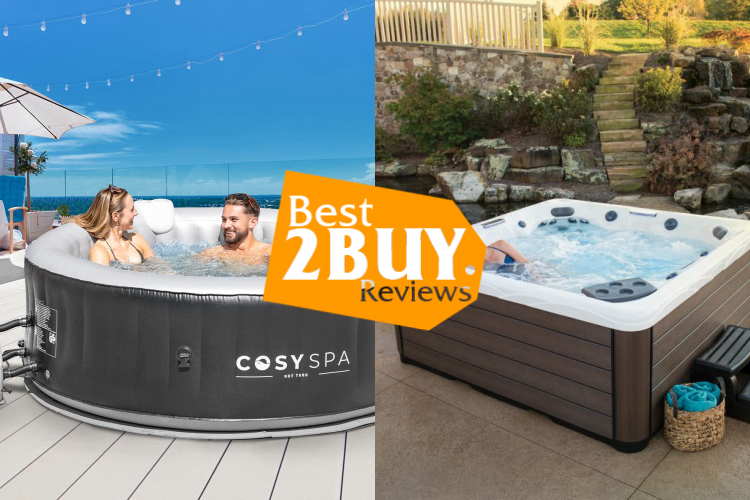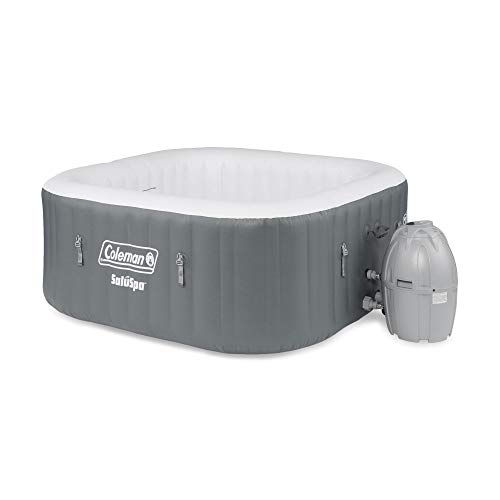The Ultimate Guide to Hot Tubs: Relaxation, Health Benefits, and Choosing the Perfect One for You

- 1. The Ultimate Guide to Hot Tubs: Relaxation, Health Benefits, and Choosing the Perfect One for You
- 1.1. What Is a Hot Tub?
- 1.2. A Brief History of Hot Tubs
- 1.3. Health Benefits of Hot Tubs
- 1.4. Factors To Consider When Choosing A Hot Tub
- 1.4.1. Inflatable Versus Non-Inflatable Hot Tubs
- 1.4.2. Shapes of Hot Tubs
- 1.4.3. Hot Tub Size
- 1.4.4. Hot Tub Materials
- 1.4.5. Special Features to Look For in Hot Tubs
- 1.4.6. How Much Does a Hot Tub Cost?
- 1.5. Conclusion
Hot tubs, commonly referred to as spas or jacuzzis, have gained growing popularity in recent times as a growing number of individuals look for avenues to de-stress, unwind, and experience the therapeutic advantages of warm water. These opulent enhancements to residences and wellness facilities provide numerous benefits, spanning from alleviating stress to enhancing physical well-being. Within this all-encompassing manual, we will delve into the realm of hot tubs, delving into their historical background, the health perks they offer, maintenance suggestions, and guidance on selecting the ideal one to suit your requirements.
What Is a Hot Tub?
A hot tub is a spacious tub designed to accommodate at least two individuals and filled with heated water. Unlike traditional bathtubs, hot tubs are specifically crafted for simultaneous use by multiple people, catering to activities such as hydrotherapy, relaxation, or simple enjoyment.
Comprising an outer cabinet that secures the shell in place, hot tubs consist of a shell that serves as the inner component holding the water. Additionally, hot tubs are equipped with pumps responsible for circulating water in and out of the tub, jets for massaging sore muscles, and filters to maintain water cleanliness.
Due to their size and the potential for water movement, most hot tub owners position them outdoors on their deck or patio. Hot tubs can be either above-ground or in-ground, with above-ground options being the more economical choice. It's important to note that hot tubs require regular maintenance, underscoring the significance of convenient accessibility.
A Brief History of Hot Tubs
The tradition of submerging oneself in warm water for relaxation and health benefits has a rich history that spans centuries. Various ancient societies, including the Greeks and Romans, are known to have utilized communal bathing facilities. However, the modern hot tub, as we recognize it today, emerged during the 20th century. In the mid-20th century, the Jacuzzi family introduced the whirlpool bath, and by the 1970s, hot tubs became widely popular. Today, hot tubs are not only linked with luxury but are also recognized for their potential positive impacts on well-being.
Health Benefits of Hot Tubs
- Stress Reduction: One of the primary motivations behind the investment in hot tubs is the alleviation of stress. The comforting warmth and gentle jets facilitate muscle relaxation, fostering a tranquil atmosphere that diminishes stress and tension.
- Enhanced Sleep Quality: The serenity induced by hot tub sessions can contribute to improved sleep patterns. The decline in body temperature following a soak in hot water signals the body that it's time for rest, resulting in a more rejuvenating night's sleep.
- Relief from Muscle and Joint Discomfort: Hot tubs are widely recognized for their effectiveness in mitigating muscle and joint pain. The water's buoyancy reduces pressure on joints, while the warmth aids in soothing sore muscles, making it an exceptional choice for those dealing with conditions like arthritis or chronic pain.
- Enhanced Blood Circulation: The warmth of hot tub water promotes blood circulation, offering favorable impacts on cardiovascular health. Improved circulation can also facilitate the healing process for injuries.
- Alleviation of Symptoms in Conditions such as Fibromyalgia: Some individuals grappling with conditions like fibromyalgia report relief from symptoms like pain and fatigue through consistent use of hot tubs.
Factors To Consider When Choosing A Hot Tub
Inflatable Versus Non-Inflatable Hot Tubs
One of the first decisions you'll need to make when choosing a hot tub is whether to go for an inflatable or non-inflatable model. Each type has its own set of advantages and disadvantages.
Inflatable Hot Tubs:
- Portability: Inflatable hot tubs boast high portability and effortless setup. They can be deflated and relocated to various places as necessary.
- Affordability: Generally more cost-effective than their non-inflatable counterparts, inflatable hot tubs present an excellent choice for those operating within budget constraints.
- Easy Installation: Setting up inflatable hot tubs is a straightforward process that demands minimal effort. Typically, there's no need for professional installation.
- Limited Durability: Inflatable hot tubs might exhibit greater vulnerability to punctures and wear over time when compared to non-inflatable models.
- Heat Efficiency: These hot tubs may not offer the same level of insulation as non-inflatable ones, potentially resulting in heat loss.
Non-Inflatable Hot Tubs:
- Sturdiness: Non-inflatable hot tubs are generally more robust and durable, providing a long-lasting investment.
- Better Insulation: Typically better insulated than inflatable hot tubs, resulting in improved heat retention and energy efficiency.
- Permanent Installation: Non-inflatable hot tubs are designed for permanent installation, offering a more integrated look in your outdoor space.
- Higher Initial Cost: Non-inflatable hot tubs tend to have a higher upfront cost compared to inflatable models.
- Less Portability: Once installed, non-inflatable hot tubs are less portable than their inflatable counterparts.
Shapes of Hot Tubs
Hot tubs come in various shapes, and the choice often depends on personal preference and the available space in your home or outdoor area. Common shapes include:
- Circular: Offers a classic and symmetrical look, promoting a sense of community as people can easily converse face-to-face.
- Square or Rectangular: Provides a more modern and streamlined appearance, often accommodating more people comfortably.
- Octagonal: Combines the best of both circular and square designs, offering a unique and visually appealing option.
Consider the aesthetics of your space and how the hot tub shape complements your existing landscape or outdoor design.
Hot Tub Size
Selecting the right size is crucial to ensure that your hot tub accommodates the number of people you intend to host and fits within the available space. Sizes vary widely, from intimate two-person hot tubs to larger models that can accommodate six or more people. Be sure to measure the area where you plan to install the hot tub and consider factors such as:
- Available Space: Ensure there is enough room for the hot tub and any additional features, such as steps or a surrounding deck.
- Intended Use: If you plan to host gatherings, opt for a larger hot tub with more seating capacity.
- Comfort: Choose a size that allows for ample legroom and personal space, promoting a comfortable and enjoyable experience.
Hot Tub Materials
The materials used in hot tub construction play a significant role in durability, maintenance, and aesthetics. Common materials include:
- Acrylic: Popular for its durability, resistance to fading, and ease of maintenance. Acrylic hot tubs often come in a variety of colors and finishes.
- Rotomolded Plastic: Lightweight and durable, this material is known for its resistance to scratches and dents. It's a cost-effective option for those on a budget.
- Wood: Traditional and visually appealing, wooden hot tubs add a natural and rustic element to your outdoor space. However, they may require more maintenance.
Consider the climate in your area, the level of maintenance you're comfortable with, and your aesthetic preferences when choosing the material for your hot tub.
Special Features to Look For in Hot Tubs
Hot tubs and spas are outfitted with a range of features, such as jets, LED lighting, and more. Here is a compilation of common features to consider:
- Jets: Propel a mixture of water and air into the hot tub, providing hydrotherapy. Generally, the cost of a hot tub tends to increase with the number of jets it possesses.
- Lighting: Enhance the hot tub experience with added ambiance. Hot tubs can be equipped with various LED lighting options, including multi-colored systems.
- Speakers: Some hot tubs are furnished with built-in speakers that are Wi-Fi compatible, allowing for an immersive audio experience.
- Built-in Cup Holders: Facilitate the convenience of keeping beverages within reach while enjoying a soak.
- Spa Trays: Provide a practical solution for keeping items like phones and snacks nearby, adding to the overall convenience of the hot tub experience.
- Headrests: Offer additional comfort, ensuring a fully relaxed state by supporting the neck and head.
- Built-in Hard Water Treatment Systems: Make the water gentler on the skin and clothing, contributing to a more comfortable and enjoyable spa experience.
How Much Does a Hot Tub Cost?
Hot tubs are available in various models, with the primary categories being portable, in-ground, and inflatable. Portable hot tubs, which are prefabricated and can be relocated, albeit with some difficulty, typically range in price from $3,000 to $6,000. In-ground hot tubs, constructed with a pre-molded liner, come at a higher cost, averaging around $12,000 to $20,000. On the other hand, inflatable hot tubs offer the utmost portability, as they can be folded and moved easily. Among the different types, inflatable hot tubs are the most budget-friendly, priced at approximately $500 to $2,000.
Conclusion
Hot tubs have undergone significant evolution since their ancient beginnings, transforming into contemporary havens for relaxation and overall well-being. Whether you're in search of stress alleviation, enhanced sleep, or a remedy for muscle and joint discomfort, a hot tub can serve as a valuable enhancement to your lifestyle. By taking into account factors like size, features, and maintenance demands, you can discover the ideal hot tub tailored to meet your requirements, bringing the opulence and health advantages of warm water therapy directly to your home.











